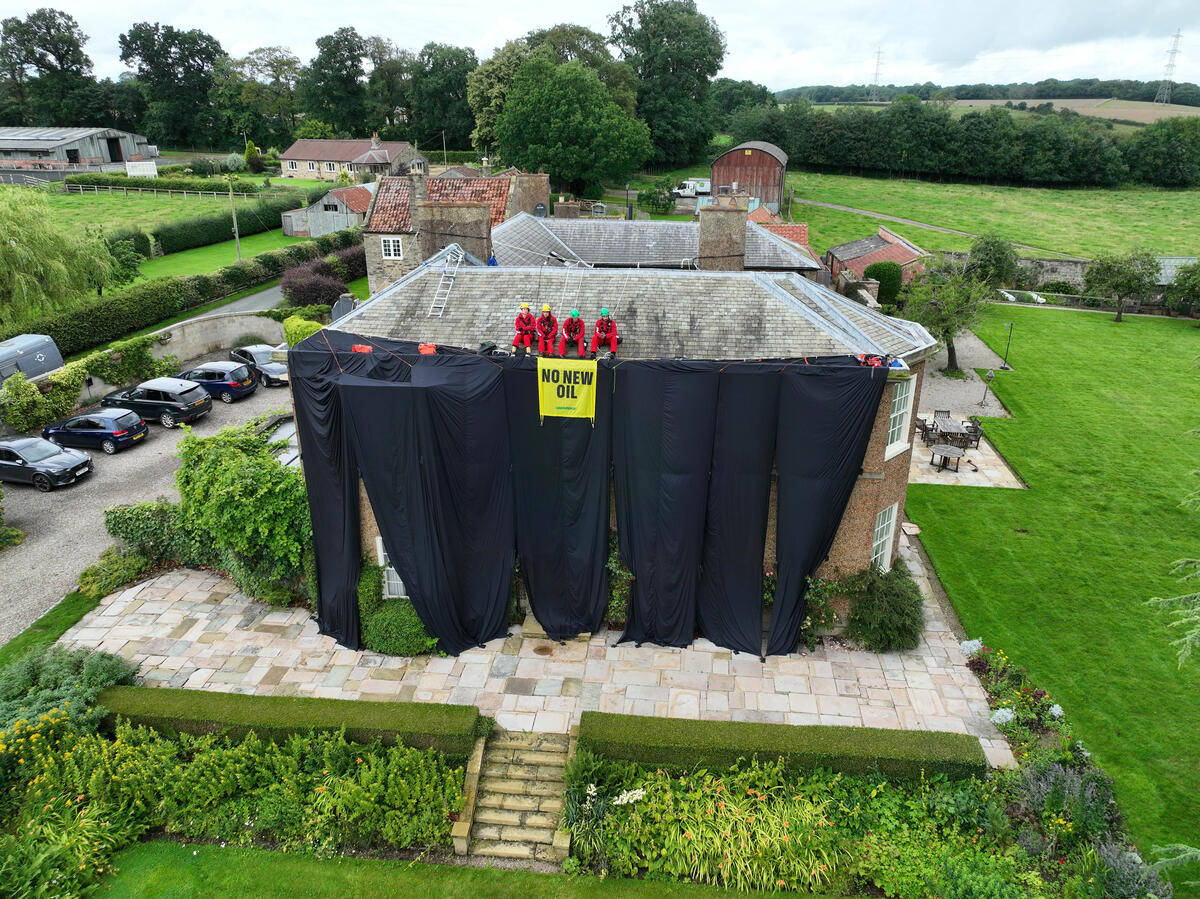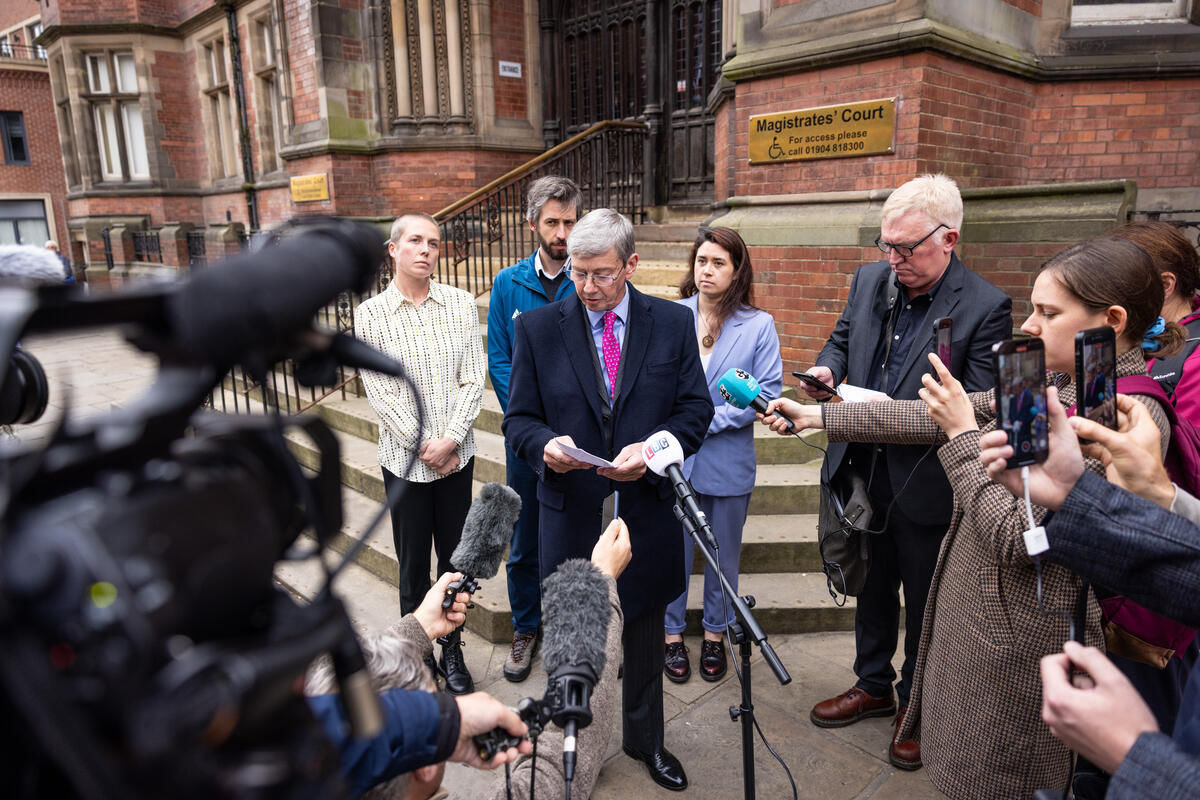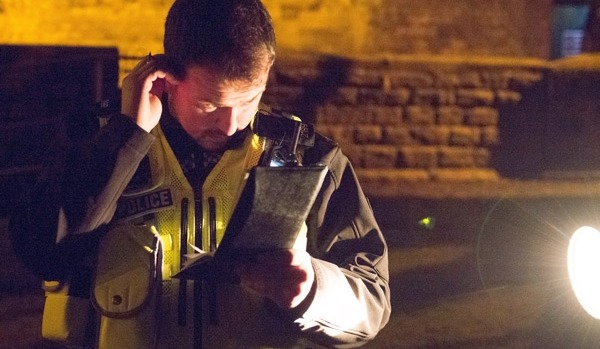Friday 20 September, 2024. York – The four Greenpeace activists who made headlines after protesting on the roof of the former Prime Minister’s mansion in Yorkshire last year have had charges of criminal damage dismissed by the Judge at York Magistrates’ Court.
In August last year, the activists draped one side of Sunak’s Yorkshire mansion in black fabric while he and his family were on holiday in California, in protest at his decision to licence ‘hundreds’ more oil and gas drilling sites in the North Sea,
The four had been charged with criminal damage for allegedly cracking some of the roof slates during their protest, but the presiding magistrate, Judge Lower, ruled that the prosecution had failed to provide sufficient evidence and there was no case for the defendants to answer.

Outside the court after the dismissal, one of the defendants, Mike Grant, said:
Justice and common sense prevailed in court today, but that hasn’t been the case for many activists recently. We have become a country that regularly sends peaceful protestors to jail, with some facing years behind bars for trying to preserve a habitable planet for us all. This has to stop. Peaceful protest is a vital part of our democracy – it gave us votes for women, the right to a weekend, and bans on commercial whaling and fracking. Only last year, Rishi Sunak was planning to hand out hundreds of new fossil fuel licences after bringing in new laws to criminalise peaceful protest. His oil and gas plans have been rejected by voters along with his government, but the damaging consequences of his anti-protest legislation live on. We want to thank all activists who have the courage to take risks and make sacrifices to protect the living world and our democracy. The last government’s plans to ‘max out’ North Sea oil and gas were deeply reckless, and not all of the damage they did can be prevented now. But every tiny fraction of a degree of future heating avoided is a life, a village, a species, a future saved somewhere in the world, and it is our moral duty to stand up and fight for it. And for Keir Starmer’s government we have a simple question: how much longer will they sit back and watch as this draconian crackdown on dissent keeps unfolding on their watch?
The four volunteer activists are:
- Michael Grant, 64, an Edinburgh resident originally from Aberdeen, formerly an officer in the parachute regiment and a financial advisor.
- Amy Rugg-Easey, 33, a Newcastle resident originally from Milton Keynes, formerly a watchmaker and a boatbuilder.
- Mathieu Soete, 38, an Antwerp resident originally from Roeselare in Belgium, formerly worked in the EU Parliament, currently an energy campaigner.
- Alexandra Wilson, 32, a Cornwall resident originally from Beverley in Yorkshire, formerly worked in the NHS, currently a bar manager.
After the verdict, Al Wilson said:
We’re not surprised that the Crown Prosecution Service brought this case – we know our protest was controversial, particularly amongst politicians who have been doing their best to criminalise as much protest as possible. But we were very careful not to break anything, including the law, and we’re happy our efforts were recognised. In our case, the court maintained Britain’s proud tradition of tolerating dissent, but that tradition is under increasing threat, with peaceful protestors being treated like terrorists and given shockingly brutal sentences.
Amy Rugg-Easey said:
We’re very proud of what we did last August, but we were just a small part of a huge movement of ordinary people across the UK who wouldn’t sit back and let Rishi Sunak destroy our futures to prop up oil company profits. Eventually that movement became part of a landslide that swept away his government, and we hope the governments that follow will learn not to engage in disinformation about the most important threat facing the world.
Political context
Since last Autumn, the debate around North Sea drilling has progressed significantly. After a year of the government rolling back climate policies, trying to encourage fossil fuel investment and using the environment as a wedge issue, this approach was firmly rejected by the electorate in July, giving the Conservatives the worst result in their history. We now have a government committed to no new licences for North Sea drilling.
Legal context
Earlier this year the Supreme Court issued a ruling in the case of Finch vs Surrey County Council which blocked the development of an onshore oil well in the Weald on the grounds that the Environmental Impact Assessment did not consider the Scope 3 or ‘downstream’ emissions from the well (ie the carbon emissions that would be produced by burning the oil once it had been extracted and sold).
This omission was described as an ‘error in law’ by the new government, which has now withdrawn from defending the planning decision giving permission to Rosebank and Jackdaw fields, and the now-abandoned Cumbrian coal mine, citing this ruling. Their Environmental Impact Assessments for North Sea drilling licences also omitted scope 3 emissions. In the case of the Rosebank field alone, the scope 3 emissions are expected to be higher than the combined annual emissions of all the 28 lowest income countries in the world. Now that the government has conceded Greenpeace’s legal challenges against Rosebank and Jackdaw, the Scottish Courts will consider the companies’ defences later this year.







